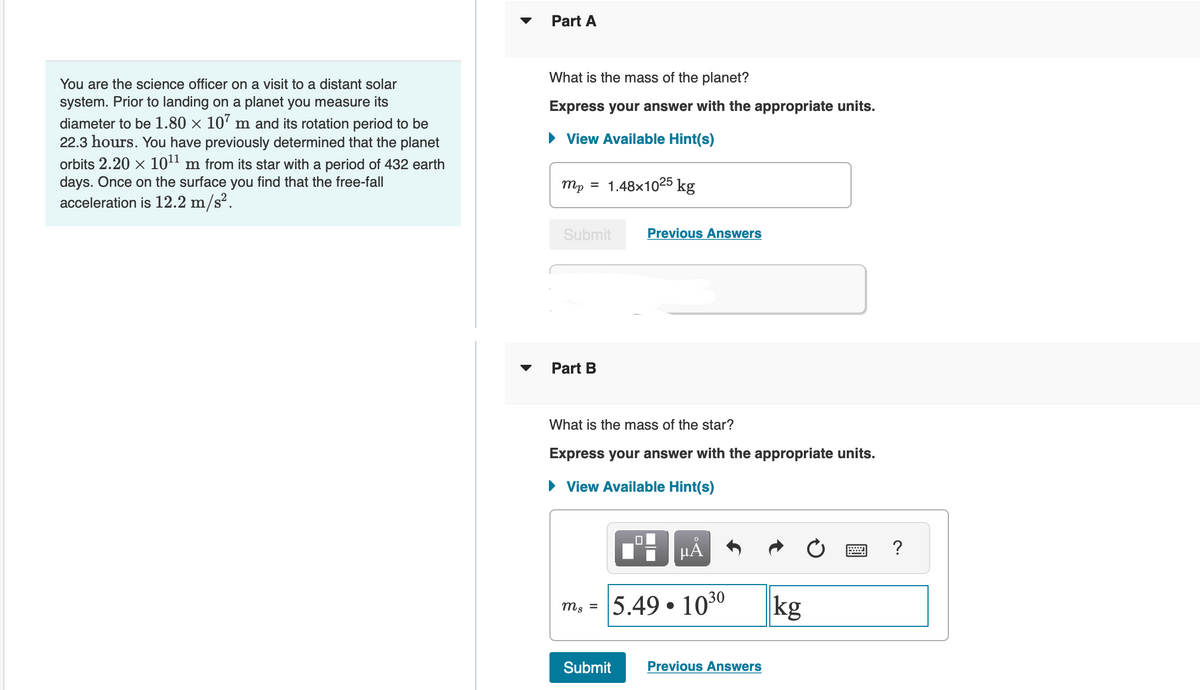You are the science officer on a visit to a distant solar system. Prior to landing on a planet you measure its diameter to be 1.80 x 107 m and its rotation period to be 22.3 hours. You have previously determined that the planet orbits 2.20 x 10¹1 m from its star with a period of 432 earth days. Once on the surface you find that the free-fall acceleration is 12.2 m/s². What is the mass of the planet? Express your answer with the appropriate units. ► View Available Hint(s) mp 1.48x1025 kg Submit Part B Previous Answers What is the mass of the star? Express your answer with the appropriate units. ► View Available Hint(s) μA mg = 5.49 1030 kg Submit Previous Answers ?
You are the science officer on a visit to a distant solar system. Prior to landing on a planet you measure its diameter to be 1.80 x 107 m and its rotation period to be 22.3 hours. You have previously determined that the planet orbits 2.20 x 10¹1 m from its star with a period of 432 earth days. Once on the surface you find that the free-fall acceleration is 12.2 m/s². What is the mass of the planet? Express your answer with the appropriate units. ► View Available Hint(s) mp 1.48x1025 kg Submit Part B Previous Answers What is the mass of the star? Express your answer with the appropriate units. ► View Available Hint(s) μA mg = 5.49 1030 kg Submit Previous Answers ?
Principles of Physics: A Calculus-Based Text
5th Edition
ISBN:9781133104261
Author:Raymond A. Serway, John W. Jewett
Publisher:Raymond A. Serway, John W. Jewett
Chapter11: Gravity, Planetary Orbits, And The Hydrogen Atom
Section: Chapter Questions
Problem 55P
Related questions
Question
Please solve the following question for part b

Transcribed Image Text:You are the science officer on a visit to a distant solar
system. Prior to landing on a planet you measure its
diameter to be 1.80 × 107 m and its rotation period to be
22.3 hours. You have previously determined that the planet
orbits 2.20 × 10¹¹ m from its star with a period of 432 earth
days. Once on the surface you find that the free-fall
acceleration is 12.2 m/s².
Part A
What is the mass of the planet?
Express your answer with the appropriate units.
► View Available Hint(s)
mp = 1.48x1025 kg
Submit
Part B
Previous Answers
What is the mass of the star?
Express your answer with the appropriate units.
► View Available Hint(s)
0
O
µĂ
m₂ = 5.49 1030
Submit Previous Answers
kg
?
Expert Solution
This question has been solved!
Explore an expertly crafted, step-by-step solution for a thorough understanding of key concepts.
This is a popular solution!
Trending now
This is a popular solution!
Step by step
Solved in 4 steps with 4 images

Knowledge Booster
Learn more about
Need a deep-dive on the concept behind this application? Look no further. Learn more about this topic, physics and related others by exploring similar questions and additional content below.Recommended textbooks for you

Principles of Physics: A Calculus-Based Text
Physics
ISBN:
9781133104261
Author:
Raymond A. Serway, John W. Jewett
Publisher:
Cengage Learning

Physics for Scientists and Engineers: Foundations…
Physics
ISBN:
9781133939146
Author:
Katz, Debora M.
Publisher:
Cengage Learning

Classical Dynamics of Particles and Systems
Physics
ISBN:
9780534408961
Author:
Stephen T. Thornton, Jerry B. Marion
Publisher:
Cengage Learning

Principles of Physics: A Calculus-Based Text
Physics
ISBN:
9781133104261
Author:
Raymond A. Serway, John W. Jewett
Publisher:
Cengage Learning

Physics for Scientists and Engineers: Foundations…
Physics
ISBN:
9781133939146
Author:
Katz, Debora M.
Publisher:
Cengage Learning

Classical Dynamics of Particles and Systems
Physics
ISBN:
9780534408961
Author:
Stephen T. Thornton, Jerry B. Marion
Publisher:
Cengage Learning

University Physics Volume 3
Physics
ISBN:
9781938168185
Author:
William Moebs, Jeff Sanny
Publisher:
OpenStax